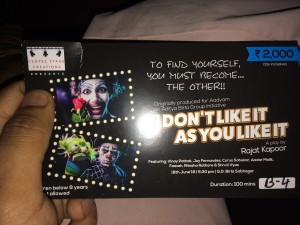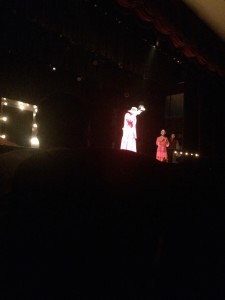2nd Live Response: “I Don’t Like It. As You Like It.”

This, last Saturday, I went to see an adaptation of As You Like It by famous Indian theatre and film personality, Rajat Kapoor titled, “I Don’t Like It. As You Like It” at the prominent theatre in my city, Kolkata, India, the G.D. Birla Sabhagar. The play had a very unique take on this renowned Shakespearean comedy – it wasn’t a recreation of the play, where the characters of the play are played by the actors and the scenes and dialogues were re-acted sequentially – as the play was premised on a troupe of 7 clowns: Me-Me (female), Co-Co (male), Po-Po (male), Vido (male), Phi-Phi (female), So-So (male), and an unnamed French clown (female) (including their director Po-Po, who was a clown directing the other actor clowns) trying to rehearse for and stage a production of As You Like It; rather, it had an independent narrative, where the characters were based on certain characteristic traits of those from As You Like It; the events that are a part of the plot are made to be allegorical of that of As You Like It and it is a great tribute to Shakespeare’s legendary comedy, albeit with some unquestionable elements of satire. The inter-character dynamics, plot constructs, and themes were made based off As You Like It, with one major twist: the director, Po-Po, decides on making his mark, when he decides to make all his male actors play the female characters of As You Like It and vice-versa, essentially, amplifying the thematic undercurrent of gender reversal and “the battle of the sexes,” which is the very basis of the play, as I have understood in my previous, independent readings.
The play was composed of two acts, both having very minimalistic set and light design and sound effects. The play opens, with the character So-So delivering Jacques’s “All the world’s a stage…” monologue, and terribly failing at it. He suffers as an actor due to his inability to memorise his dialogues. This entire sequence was comically performed and indicative, very early on in the play, of the troupe’s calibre (very resonant to the element of farce, I was introduced to in Noises Off!). The end of this scene has this one dialogue which stuck with me, as So-So fumbles with his lines, trying to remember what comes next, when he poses this question to the audience: “If all the world’s a stage, who is the bloody prompter?”
The next scene opens with the other actors hurdled up, introducing themselves and informing the audience about their relationships with each other – Me-Me, the lead actress who initially plays Rosalind, is the lover of lead actor, Co-Co, who initially plays Orlando (before they switch their roles!); their relationship resembles the love story of the two protagonists from As You Like It: full of passion, interspersed with fits of scorn and anger; Vido, the second lead, who is set to play Silvius is obsessed with Phi-Phi, the actress, who is set to play Phebe: they have a relationship much like that of these two characters (and only come to the same realisation as the two original characters, when they quite literally, step into each others’ shoes). I thought that the concept of having this gender reversal really added to the appeal of this original production because of the way it captures the essence of As You Like It. It also ties in extremely well, adding a comedic element, into the scenes where Orlando (as Me-Me), has to talk to Rosalind or Ganymede (as Co-Co – effectively adding a third layer to the character) about the different way time moves for different people (especially the lover), the different signs of a lover and the other encounters they have in the Forest of Arden. The events that transpire in the plot of “I Don’t Like It. As You Like It” have been made to resemble some of those that place in that of As You Like It, like: when the troupe is “banished” by the director’s brother, Frederick, who owns the warehouse they rehearse in. Then, they decide to go into a space suggested by Vido (who has qualities of Touchstone such as a “wry wit”) called “Arden,” where they immediately begin to romanticise the openness of nature (much like the scene where Duke Senior does the same, where he is surrounded by his noble courtiers). The narrative is interspersed with a lot of present-day pop-references (with regards to India of course), which add to the relevance to this adaption with respect to the audience. The end sees So-So performing Jacques’s monologue once more, and failing at it again, but he succeeds in cleverly improvising the seven stages of man, with his own, very suitable analogies (and at the same time not moving out of the framework set by the original monologue); this time he uses his sock-puppet to deliver the lines. Like As You Like It, the director remains true to the Shakespearean theme by adding an epilogue, where like the original, you have Rosalind (yes, both the Rosalind in this case!) speaking to the audience.
On the whole, “I Don’t Like It. As You Like It” was a very enjoyable watch, with intriguing parallels to the Shakespeare comedy, combining it with a modern-day relevance. And, it’s safe to say I certainly did “Like This. As You Like It.”
 (So-So delivering the monologue in the end with his sock puppet)
(So-So delivering the monologue in the end with his sock puppet)
